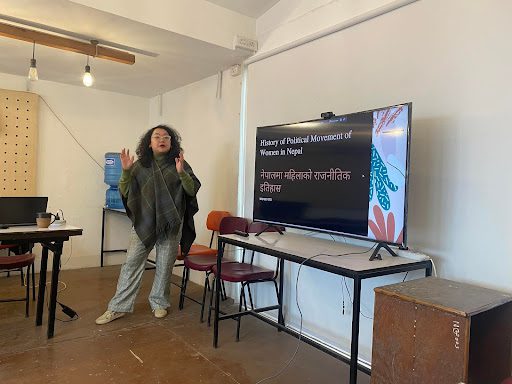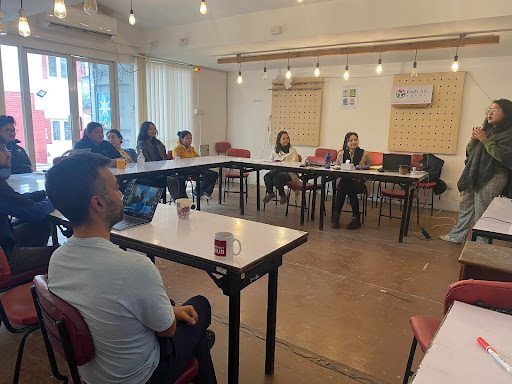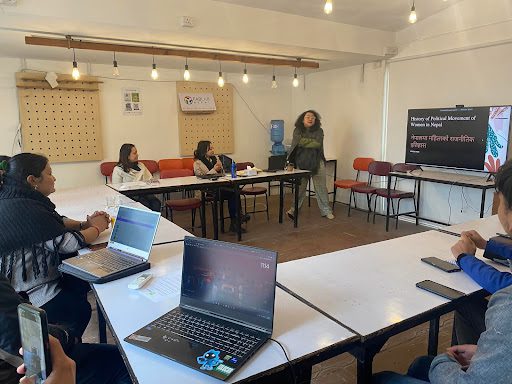This Woman’s Month: A Walk Through the Political History of Women in Nepal and Impact Hub’s Collective Commitment Towards Diversity, Equity, and Inclusion (DEI)
By: Samanata Thapa

On this year’s Women’s Day, I had the opportunity to curate and deliver a workshop on the Political History of Women in Nepal for my colleagues at Impact Hub Kathmandu. I am deeply grateful to my colleagues for providing me with this opportunity, as well as for the opportunities I had as a young woman with Young Women’s Political Leadership Institute 2018 at Women Lead Nepal and Women Leadership Summit 2018-2020 at Ujyalo Foundation for equipping me with the necessary skills and knowledge to lead this session. These feminist organizations have played a crucial role in building my capacity to deliver this workshop, which focuses on women’s political participation and intersectionality.
As an indigenous woman, I feel incredibly fortunate to have access to education, the right to vote, and representation in our constitution today – privileges that were once denied to women. I owe it to the courageous urban and rural women who have had to raise their voices, pens, clothes, or weapons to demand the most fundamental rights for a just society. Their struggles were not in vain, and we stand on the shoulders of these women, who paved the way for us to have a more equitable society.
The workshop was a small effort to recognize these remarkable women’s roles, sacrifices, and struggles through a political timeline by reflecting on significant political events and transitions. The curated timeline featured key events and transitions, including the movement against the Rana dynasty, the first Janaandolan (Mass Movement I), the ten-year People’s War, Mass Movement II, the constituent assembly election, the constitution of Nepal and the local, parliamentary and provincial elections in Nepal through a visually engaging set of infographics, personal anecdotes and photographs from the past. Similarly, the workshop also featured important events led by women from diverse marginalized communities like the Karjahi movement in 1980 led by Tharu women, and the significant rise in voices from diverse communities after the mass movement II in 2006 AD, including Dalit women who led the Badi Movement, and the LGBTQIA+ community, who have been leading the charge for greater inclusion and acceptance in Nepali society.


Together, we delved into a few sets of data and had thought-provoking discussions on important topics such as reservation, the pressing need and challenges of 33% representation of women in politics, and the importance of having reserved ward seats for Dalit Women and women in local elections. Similarly, the team was quick to point out flaws they noticed during the recent elections, including the design of our ballot papers and lack of inclusivity to exercise one’s right as a voter.


At Impact Hub Kathmandu, we are committed to embracing Diversity,Equity, and Inclusion (DEI) now more than ever. As we expand our field of work with youth, women, and marginalized civic actors in Madhesh and Lumbini Province, it has become even more important to ensure that we are equipped with the necessary knowledge and understanding to work in these diverse environments and we needed to learn from the transitions that the country has been through. We recognize that it is crucial to acknowledge the contributions of diverse communities and continue to honour their legacy by striving for an inclusive society.
After expanding our work at Impact Hub to Madhesh and having the privilege of meeting incredible grassroots and network leaders who are tirelessly working on issues related to human rights and Dalit land rights, I realize that I have unintentionally overlooked the Madhesh Andolan and its significance. I welcome any advice or recommendations on how I can better ensure that these workshops are more inclusive and recognize the contributions of all communities in Nepal’s political history.
Finally, I would like to invite those interested in expanding their political literacy and enhancing their team’s knowledge. I have a visually engaging set of data that I would love to share through workshops. I am always eager to collaborate and work with others passionate about creating a more informed and engaged society. So, please do not hesitate to reach out to me at [email protected] if you are looking for unique and informative workshops for your team.